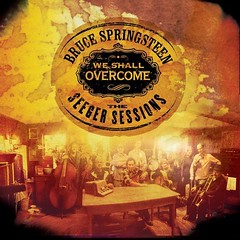Is He Still The Boss? Vol. 2
 Okay, I still say Springsteen is no longer The Boss. However, J-Mac did buy me his We Shall Overcome: The Seeger Sessions CD for our anniversary, and it isn't too bad at all. It can be compared favourably to folk music, dixieland jazz and The Band's Music From Big Pink.
Okay, I still say Springsteen is no longer The Boss. However, J-Mac did buy me his We Shall Overcome: The Seeger Sessions CD for our anniversary, and it isn't too bad at all. It can be compared favourably to folk music, dixieland jazz and The Band's Music From Big Pink.I still say stand by my June blog entry that says his music always suffers when there is no E Street Band.
Top 5 Non E Street Band Albums
1. Tunnel Of Love
2. The Seeger Sessions
3. Lucky Town
4. Nebraska
5. Human Touch
However, The Seeger Sessions has been in heavy rotation in my car all week. Funnily enough, despite the fact that some of these songs are over 100 years old, I only know one of them. Buffalo Gals, which is sung by Jimmy Stewart and Donna Reed in It's A Wonderful Life and the lyrics are "kind of" featured in a song by Eminem called Without Me.
My two favourite songs are based on old spirituals the first called O Mary Don't You Weep No More and Jacob's Ladder. I have included the liner notes from Dave Marsh for each of the songs as well as for Mary footage from a concert and for Jacob, the actual video for the song.
Oh, Mary Don't You Weep
One of the most important Negro spirituals, predating the Civil War. The Mary of this song is not Mary the Blessed Virgin or Mary Magdalene, but Mary of Bethany who, with her sister Martha, pleaded with Jesus to raise their brother Lazarus from the dead, their grief so great that Jesus wept himself at the sight of it (John 11: 28-35). A very common version of the song begins: "Oh Mary, don't you weep / Oh Martha, don't you mourn.
But the bulk of this version of the song is drawn from the Old Testament book of Exodus, especially the terrifying reassurance of the chorus that "Pharoah's Army got drown-ded" (always sung this way). The last verse here reaches even further back, all the way to the story of Noah in Genesis, to God's covenant, expressed in the "rainbow sign" that he will never again use a flood to destroy mankind (Genesis 9: 9-17). That the alternative apocalypse is fire is pure but potent folklore. James Baldwin took this image from "O Mary Don't You Weep" as the title of his most enduring account of American racial relations, The Fire Next Time.
Baldwin did so appropriately because, from slavery times down through the Southern civil rights movement of the 1950s and 1960s, these images represent the struggle against bondage and the hope of liberation. "O Mary Don't You Weep" is the first of three songs on this album that were sung during the civil rights movement as "freedom songs."
Many of the verses here, particularly the first three, also crop up in other spirituals. These are called "floating verses." Almost all such verses are freedom metaphors.The most famous recording of "O Mary Don't You Weep" is undoubtedly by the Swan Silvertones; an interpolation by that group's leader, Claude Jeter, inspired Paul Simon to write "Bridge Over Troubled Water." The earliest recording was made by the Fisk Jubilee Singers in 1915, and it has been recorded by innumerable gospel quartets and soloists since then, notably the Golden Gate Quartet with Josh White, the Soul Stirrers with Sam Cooke, in addition to the Swans. But not only by them: Mississippi John Hurt, Nat "King" Cole, Burl Ives, Roger McGuinn, Aaron Neville, Bobby Darin and Jimmy Witherspoon have all recorded it. Pete Seeger's version of the song is on various records from the 1964 Newport Folk Festival; it is also contained on American Favorite Ballads Vol. 1.
Jacob's Ladder
A Negro spiritual based on Genesis 28:11-19, best known as a Sunday School tune. It refers to the prophetic dream given to Jacob at Beth-El, while he is fleeing his brother, Esau, whom Jacob has cheated out of his inheritance. In the dream, angels are ascending and descending a ladder to heaven. While they do this, God promises Jacob that his seed "shall be as the dust of the earth" and spread throughout the world.
Slaves related to the dream powerfully, because it ended with a covenant that promised liberation: "I will not leave thee, until I have done that which I have spoken to thee of." (This is consistent with the Midrash interpretation of the steps of the ladder as the exiles that the Jews would suffer.)
"Jacob's Ladder" is another song that is much more commonly sung than recorded. Arlo Guthrie, Jane Siberry and Greg Brown made contemporary versions. There are vintage roots recordings by, among others, Hylo Brown, E.C. Ball, and Paul Robeson and gospel renditions by the Staple Singers, Bernice Johnson Reagon, Doris Troy and the Clara Ward Singers. Pete Seeger's version can be found on Singalong: Live at the Sanders Theater, Cambridge, Massachusetts, 1980.
Labels: Music

0 Comments:
Post a Comment
<< Home